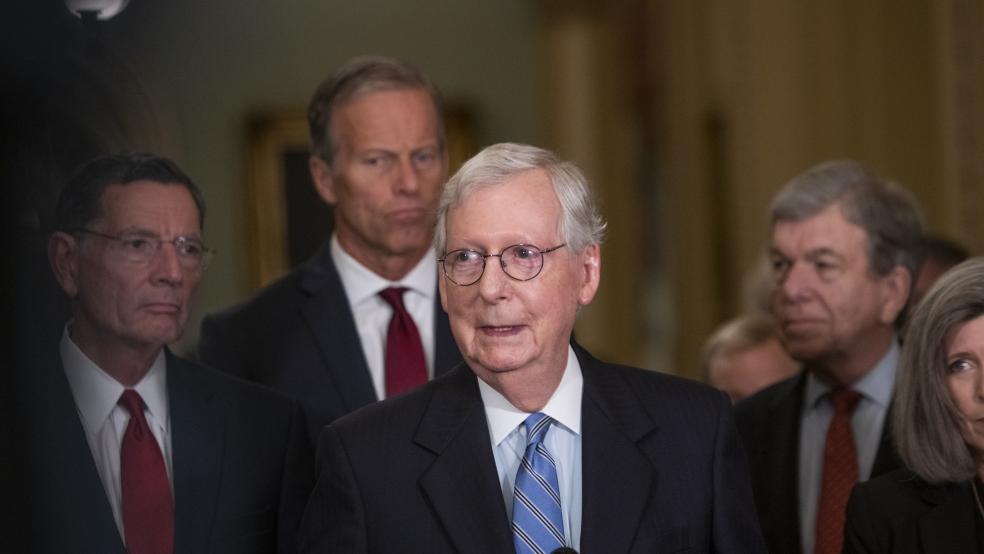Even though they have now agreed to topline spending figures for 2024, lawmakers need to race with almost unprecedented speed if they want to pass full-year appropriations bills before a January 19 deadline. On that date, parts of the federal government will shut down if Congress fails to act to provide funding, and more agencies could close on February 2, when another tranche of funding runs out.
Doubts are growing that lawmakers can complete their work in time, and on Tuesday Senate Minority Whip John Thune stated what is becoming increasingly obvious: Congress will need to pass another short-term funding bill to avoid a government shutdown.
“The idea that we're going to get those [initial appropriations bills] done in next week or even for that matter by Feb. 2 — which is the second tranche of the second eight bills — I think it's unrealistic,” Thune told reporters. The South Dakota Republican said that a continuing resolution to provide short-term funding would likely need to run into a “March timeframe” to provide enough time to write and pass the 12 annual appropriations bills.
Some lawmakers expressed agreement with Thune, including Senate Minority Leader Mitch McConnel, who told reporters, “Obviously we’re going to have to pass a CR.” Republican Sen. Shelley Moore Capito of West Virginia also agreed, while warning House Republicans to avoid a government shutdown. “I’ve lived through more than a few shutdowns,” she said. “A shutdown is a road to nowhere. Nobody wins in a shutdown, and particularly the American people.”
Still, not everyone is on board. Sen. Lisa Murkowski, a Republican from Alaska who sits on the appropriations committee, said she saw no need for more time. "What does that do? That lets the pressure off of everybody to set our numbers, to get cracking, to move things through the process,” she told Politico.
More headaches for Johnson: The need to pass a continuing resolution could be a problem for Speaker Mike Johnson. In November, Johnson said he was “done with short term CRs,” suggesting that he’d rather see a shutdown than extend short-term funding once again. However, Punchbowl’s Jake Sherman and Andrew Desiderio report that resistance to another CR is fading among House GOP leaders, who are coming around to the idea that another funding bill will be necessary to avoid the political damage that would come with a government shutdown.
That may not sit well with Johnson’s critics on the right, who have been sharply critical of his performance on the 2024 spending agreement – an agreement that is essentially the same as the one that former Speaker Kevin McCarthy agreed to last year. One GOP House member told Punchbowl that there are “significant concerns” about Johnson’s “ability to jump to this level and deliver conservative wins.” Some conservatives think Johnson is “way, way over his head,” the unnamed lawmaker said, adding that “Mike is struggling to grow into the job and is just getting rolled even more than McCarthy did.”
Republican Rep. Chip Roy of Texas told CNN that he is “very disappointed” in the 2024 spending agreement agreed to by Johnson. “I wish Speaker Johnson weren’t doing this,” he said. “And hopefully we can try to figure out what we can do to change it in the next few days.”
Asked if he would support an effort to remove Johnson from the speakership, in a repeat of the uprising against McCarthy in October, Roy said, “That’s not the road I prefer.” But he didn’t rule it out, saying “we’ll see what happens this week.”
Another thing that can’t be ruled out is a government shutdown. One-time speaker candidate Rep. Jim Jordan of Ohio said Tuesday that he wants to include border restrictions in the appropriations bills – something that Democrats will almost certainly reject. If the government shuts down because of the inclusion of border issues in the funding bills, “that's on them,” Jordan told CNN’s Manu Raju.
The bottom line: The good vibes from this weekend’s topline spending agreement seem to have dissipated pretty quickly, leaving lawmakers with just 10 days to figure out how to fund the government and prevent a shutdown in January.




